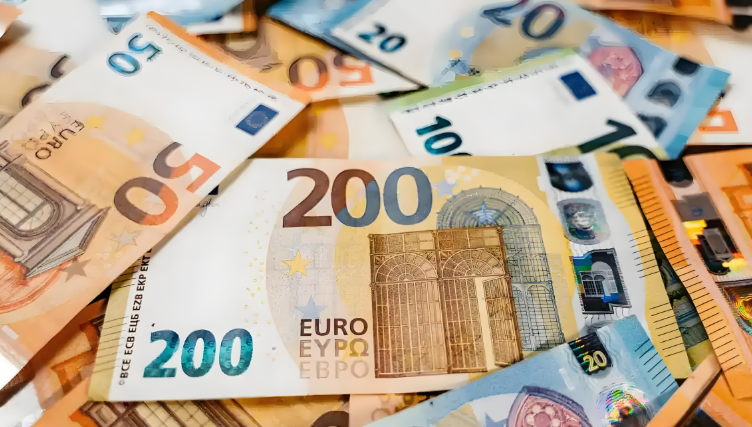Euro Exchange Rate May Face Impact
Advertisements
The landscape of currency trading is a realm often beset by optimism, yet, as recent trends indicate, it may be teetering precariously on the edge of misplaced confidence. The derivatives market, particularly for the euro, is showcasing an unusual calmness. With many euro options set to expire just after the upcoming Sunday, traders appear convinced that the euro will strengthen further, as bearish sentiment surrounding the currency has begun to dissipate. This sense of assuredness is mirrored in the stock markets, with Germany’s DAX index hitting historical highs, seemingly reflecting a collective belief in stable and inevitable outcomes.
However, lurking beneath the surface of this tranquility lies a potential hazard: if the Christian Democratic Union (CDU) and its Bavarian counterpart, the Christian Social Union (CSU), which have consistently led in polls, struggle to form a coalition government, the current positions taken by investors could face a severe shake-up. The political landscape in Germany is notably intricate, and should the CDU/CSU coalition get bogged down in negotiations, increasingly entwined with smaller parties, we could witness the euro-dollar exchange rate heading perilously close to parity.
In reaction to these emerging uncertainties, analysts from Société Générale have advised investors to take precautionary measures by purchasing protective puts on euro positions. Similarly, Commerzbank has been vocal in alerting its clients about the associated risks as the political narrative continues to evolve. Michael Brown, the senior research strategist at Pepperstone, reflects a sentiment that many traders share, remarking, “Everyone seems to believe that no surprises will emerge. That complacency could lead to a more significant market shock.”

Brown elaborates on the conundrum posed by the protracted negotiations for a coalition government—and how the rising popularity of the far-right Alternative for Germany (AfD) party complicates matters. He suggests that should negotiations drag on, especially in the wake of the AfD’s surging support, Europe could find itself ensnared in what could be termed “the worst-case scenario.” His prediction hints at a possibility where the market’s immediate reaction may see the euro plummet to below $1.03. As of this writing, the euro has already dipped by 0.3%, now sitting at 1.0466—a rather stagnant performance overall this week.
Michael Pfeiffer, a forex strategist at Commerzbank, echoes this sentiment, proclaiming that his expected scenario involves a government formation led by Friedrich Merz of the CDU. However, he notes a caveat, stating, “The lack of a clear majority evidently poses risks to the euro.”
In a rather curious contrast, options traders seem unfazed by the potential volatility lying ahead. Data from custodians and clearinghouses indicates that 60% of the options traded this year that are set to expire on Monday are betting on a stronger euro. Since the beginning of the year, the euro-dollar exchange rate has oscillated in the range of $1.02 to $1.05, and current capital flows suggest that investors anticipate the euro will at least test the upper boundaries of this range again.
Bloomberg's cross-asset strategist, Vin Ram, comments on this phenomenon, stating, “From the forex market to the equity market, there’s a prevalent sentiment that the results will align with previous polls, which effectively underestimates the risk of unexpected outcomes.” He cautions that if actual results diverge vastly from forecasts, making coalition formation difficult, the optimistic sentiment surrounding fiscal policies could swiftly unravel—and the euro would suffer in turn.
The current expectations concerning euro fluctuations appear remarkably subdued. Presently, the premiums for hedging against euro volatility over the week ahead are approximately 100 basis points lower than the annual average, signifying that almost no traders are bracing for a downturn at this moment. Such a relative stillness starkly contrasts the heightened anxiety witnessed in November of the previous year, when the overnight volatility of the euro against the dollar surged to levels not seen in over four years.
Despite this outward appearance of calm, analysts from Société Générale have emphasized that traders would be wise to procure euro put options as a safeguard against potential adverse outcomes. The market's apparent confidence has led to the perception of cheaper hedging costs, prompting the bank to propose the acquisition of options to sell euros over the coming fortnight, particularly to hedge against a decline below the $1.03 threshold.
There is a prevailing notion that risks are being “underestimated.” Jordan Rochester, the head of fixed income, forex, and commodity strategy at MUFG, points out the apparent lack of realistic pricing in currency and bond markets concerning the threats posed by an impasse in budgetary reforms and increased spending in Germany.
Furthermore, strategists from Crédit Agricole have articulated in a recent report that the “worst-case scenario” for the euro would be a scenario where the AfD garners significantly more support than reflected in recent polling. They outline that such a reality could considerably complicate attempts to establish a coalition government formed of mainstream parties, ultimately dragging the euro-dollar exchange rate back down to the recent low of around $1.03.
On a broader scale, an overarching risk remains—the potential stagnation of coalition negotiations could stymie Germany's efforts in advancing budget reforms and bolstering expenditure. With the U.S. government intent on curtailing its security role in Europe, the urgency for European nations to increase investments in safeguarding against future challenges from Russia is becoming ever more apparent.
Sam Lynton-Brown, global macro strategy head at BNP Paribas, reflects, “The market seems to believe that because a coalition government with an appetite for increased spending could emerge, everything will happen swiftly. But that’s not the case in Germany. The average time taken to form a coalition government exceeds two months.” This underscores the intricate interplay of political dynamics at play, which could profoundly impact both the euro and the broader financial market landscape.